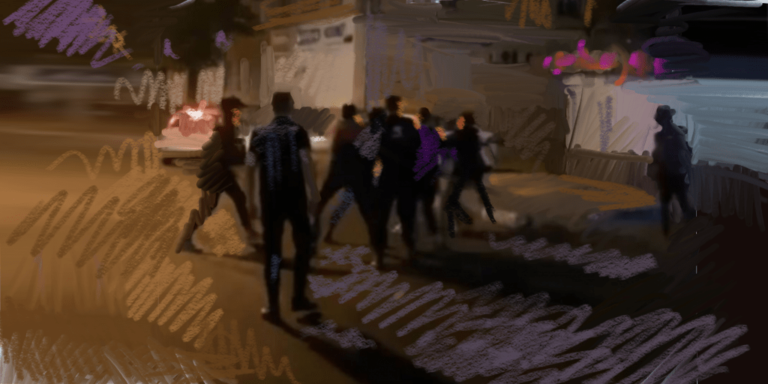Written by Bruce Pannier
The March 22 terrorist attack on Moscow’s Crocus City Hall has led to a wave of xenophobia targeting Central Asians in Russia, raising many questions for Central Asia, including concerns about what kind of friendly country Russia actually is.
Amid increasing reports of attacks against Central Asians in Russia in late March, leaders of Central Asian countries held a series of meetings in April.
Kazakhstan’s President Kassym-Jomart Tokayev met with Uzbek President Shavkat Mirziyoyev in Khiva, Uzbekistan on April 4 and 5. At the same time, Turkmenistan’s Chairman of the People’s Council Khalkh Maslahti and former President Gurbanguly Berdimuhamedov visited Tajikistan and met with Tajik President Emomali Rahmon. Meanwhile, Kyrgyzstan’s President Sadyr Japarov visited Kazakhstan on April 18 and 19, the same day Uzbek President Mirziyoyev visited Tajikistan to meet with President Rahmon.
Reports of the meeting focused on celebrating fraternal ties and signing bilateral agreements. There was no mention of talks about the rapidly evolving dilemma with Russia.
The attack, which Russia claims killed more than 140 Tajiks, including Russian citizens and migrant workers. At least 4 million migrant workers from Uzbekistan, Kyrgyzstan and Tajikistan work in Russia, with some estimates putting the number at twice that number or even more.
Following the attacks, all Central Asians became viewed with suspicion in Russia. Passengers from Central Asia arriving in Russia were held up at airports for additional document checks, sometimes for more than 24 hours, and Russian police raided dormitories and other facilities believed to be housing migrant workers from Central Asia.
The first four Tajik suspects were shown on Russian television apparently being tortured, with an FSB officer filming one of them cutting off part of the ear and forcing the severed ear piece into the suspect’s mouth.
Russia was a colony of Central Asia, and the leaders of the five Central Asian countries are well aware of that history. Whenever Central Asian and Russian officials meet since the collapse of the Soviet Union in late 1991, they speak of historically friendly ties and valuable partnerships.
This image has often been difficult to convince Central Asians, especially since Russia began its full-scale invasion of Ukraine in late February 2022.
Some Russian nationalists, including politicians, talk about reclaiming “historic Russian lands,” usually referring to all or part of Kazakhstan.
Alexander Bastrykin, head of Russia’s Investigative Committee, said in May 2023 that migrant workers seeking Russian citizenship should be required to serve in the Ukrainian military, a call backed by Mikhail Matveev, a member of the State Duma, who added: “Where are our Tajik battalions?”
There have been many similar examples since February 2022. Both Russian and Central Asian government officials have downplayed the comments, saying they are personal views and do not reflect the Kremlin’s position.
However, in January 2024, Deputy Speaker of the State Duma of Uzbekistan Alisher Kodirov questioned why such comments continued if these were not the views of the Russian government.
Kodyrov cited Russian nationalist politician Zakhar Prilepin’s comments at a December 2023 Moscow press conference that Russia should annex Uzbekistan because 2 million Uzbeks work in Russia. , and a month later, Russian historian Mikhail Smolin appeared on Russia’s NTV channel and stated that Uzbeks (and Kazakhs and Azerbaijanis) did not exist as an ethnic group before the Bolshevik Revolution. was reacting to.
“Apparently,” Kodirov said.[the Russian authorities] I’m interested in that kind of rhetoric. ”
This was before the Crocus City Hall attack, and whereas before it was possible to limit racist remarks to a few Russians, now it’s attacks in which ordinary Russians attack Central Asians. Reports are becoming more frequent.
In one video, a Tajik schoolgirl getting beaten up in the classroom Russian boys do nothing to stop their teachers watching.
A Kyrgyz woman named Ayperi Jumali Kuzi said she was kicked and punched in the face by an unknown Russian man in Moscow, who told her, “You are all terrorists. You shouldn’t be in Russia. Get out of here!”
in another videoOn the Moscow subway, a group of young Russian men shouted “Russia is for Russians” at a girl from Yakutia, a region in northeastern Siberia that has been part of Russia since the 17th century.
Russian authorities seem uninterested in calling on their citizens to stop these attacks, and Russian police have not been proactive in arresting the attackers.
It is likely that Central Asians will see these social network posts and hear many more similar stories from friends and relatives working in Russia.
There is no way to hide what is happening in Russia from the people of Central Asia, and there is no way to blame such acts on an isolated minority of people in Russia. This does not mean that all or even most Russians feel or act that way, but the people responsible for these attacks are ordinary Russian citizens who are not affected in any way by their actions. Apparently not.
This must have been a topic discussed informally during meetings of the heads of state of Central Asia. They must publicly tell their people that Russia is an ally, a partner, and a friend. The big question now is whether anyone, including the leaders of Central Asian countries, still believes this to be true.
Bruce Panier is a Central Asia research fellow at the Foreign Policy Research Institute’s Eurasia Program, a member of the advisory board of the Caspian Policy Center, and a longtime journalist and correspondent covering Central Asia, currently appearing regularly on RFE/RL’s Majlis podcast.

